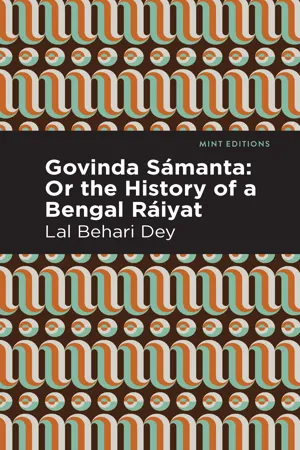
- 282 pages
- English
- ePUB (mobile friendly)
- Available on iOS & Android
About This Book
Govinda Samanta: Or the History of a Bengal Raiyat (1874) is a novel by Lal Behari Dey. Inspired by a lifetime dedicated to serving the poor and oppressed, Lal Behari Dey wrote Govinda Samanta in order to portray the life of Bengali peasants in a positive, human light. Praised by Charles Darwin, awarded a substantial prize by a prominent Bengali zamindar, Lal Behari's novel is a masterpiece of Bengali literature. "It was considerably past midnight one morning in the sultry month of April, when a human figure was seen moving in a street of Kánchanpur, a village about six miles to the north-east of the town of Vardahamána, or Burdwán. There was no moon in the heavens, as she had already disappeared behind the trees on the western skirts of the village…" After introducing his novel with a brief warning to readers, Lal Behari opens his story with a beautiful description of village life in Bengal. In episodic fashion, he follows one "human figure" after another, each of them enriching his description of his native land. Centered on the raiyat boy Govinda, the story follows the journey from innocence to experience of a youth shaped by the stories and traditions of his village. Opposed to flowery language and romanticism, he hopes to tell "a plain and unvarnished tale of a plain peasant, living in this plain country of Bengal." Praised upon publication, Govinda Samanta: Or the History of a Bengal Raiyat is a compelling and understated narrative of working-class life from an author who dedicated his own life to serving the poor. This edition of Lal Behari Dey's Govinda Samanta: Or the History of a Bengal Raiyat is a classic work of Bengali literature reimagined for modern readers.
Since our inception in 2020, Mint Editions has kept sustainability and innovation at the forefront of our mission. Each and every Mint Edition title gets a fresh, professionally typeset manuscript and a dazzling new cover, all while maintaining the integrity of the original book.
With thousands of titles in our collection, we aim to spotlight diverse public domain works to help them find modern audiences. Mint Editions celebrates a breadth of literary works, curated from both canonical and overlooked classics from writers around the globe.
Frequently asked questions
Information
Table of contents
- Cover
- Title Page
- Copyright
- Epigraph
- Contents
- I. Premises what the Reader is to Expect, and what he is not to Expect, in this Authentic History
- II. Introduces an Old Woman to the Reader
- III. Sketches a Village in Bengal
- IV. Describes a Rural Scene, and ushers our Hero into the World
- V. Photographs a Ráiyat’s Cottage, and those who live in it
- VI. Fixes the Fate and Name of our Hero
- VII. The Protectress of Children
- VIII. The Village Astrologer
- IX. An Important Discussion
- X. The Five-faced
- XI. Household Matters
- XII. The Village Schoolmaster
- XIII. The Match Maker
- XIV. Malati’s Marriage
- XV. The Vásarghar
- XVI. The Village Ghost
- XVII. Govinda At School
- XVIII. The Satí
- XIX. Evenings at Home
- XX. The Hindu Widow
- XXI. Odds and Ends
- XXII. Pastoral Scenes
- XXIII. Govinda’s Friends
- XXIV. Great Sensation in the Village
- XXV. The Village Market
- XXVI. Ladies’ Parliament
- XXVII. The Nectar-mouthed Mother-in-law
- XXVIII. Events at Durgánagar
- XXIX. All about Paddy
- XXX. The Navánna
- XXXI. The Harvest
- XXXII. Matters Hymeneal
- XXXIII. The Sugar-cane
- XXXIV. Áduri becomes a Vaishnavi
- XXXV. Alanga goes on Pilgrimage
- XXXVI. The Car Festival
- XXXVII. Bengal Fever and the Village Leech
- XXXVIII. The Situation
- XXXIX. The Zaminádr of Kánchanpur
- XL. Politics at the Smithy
- XLI. Before the Zamindár
- XLII. The Indignation Meeting
- XLIII. Fire! Fire!
- XLIV. The Mahájan
- XLV. The Village Grog-shop
- XLVI. The Indigo-Planter of Durgánagar
- XLVII. The Advances
- XLVIII. The Zamindár of Durgánagar
- XLIX. All About Indigo
- L. Bengali Heroism
- LI. The Affray
- LII. What Happened in Father-in-law’s House
- LIII. The Police Investigation
- LIV. Mádhava’s End
- LV. The Lares and the Penates
- LVI. A Gala Day
- LVII. Kálamánik
- LVIII. The Pancham
- LIX. The Ráiyats’ Magna Charta
- LX. The Epidemic
- LXI. The End
- Glossary of Indian Terms
- A Note About the Author
- A Note from the Publisher